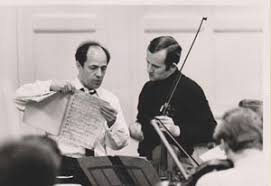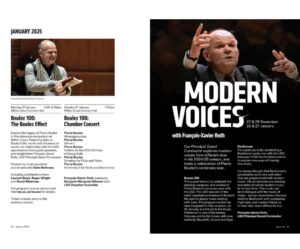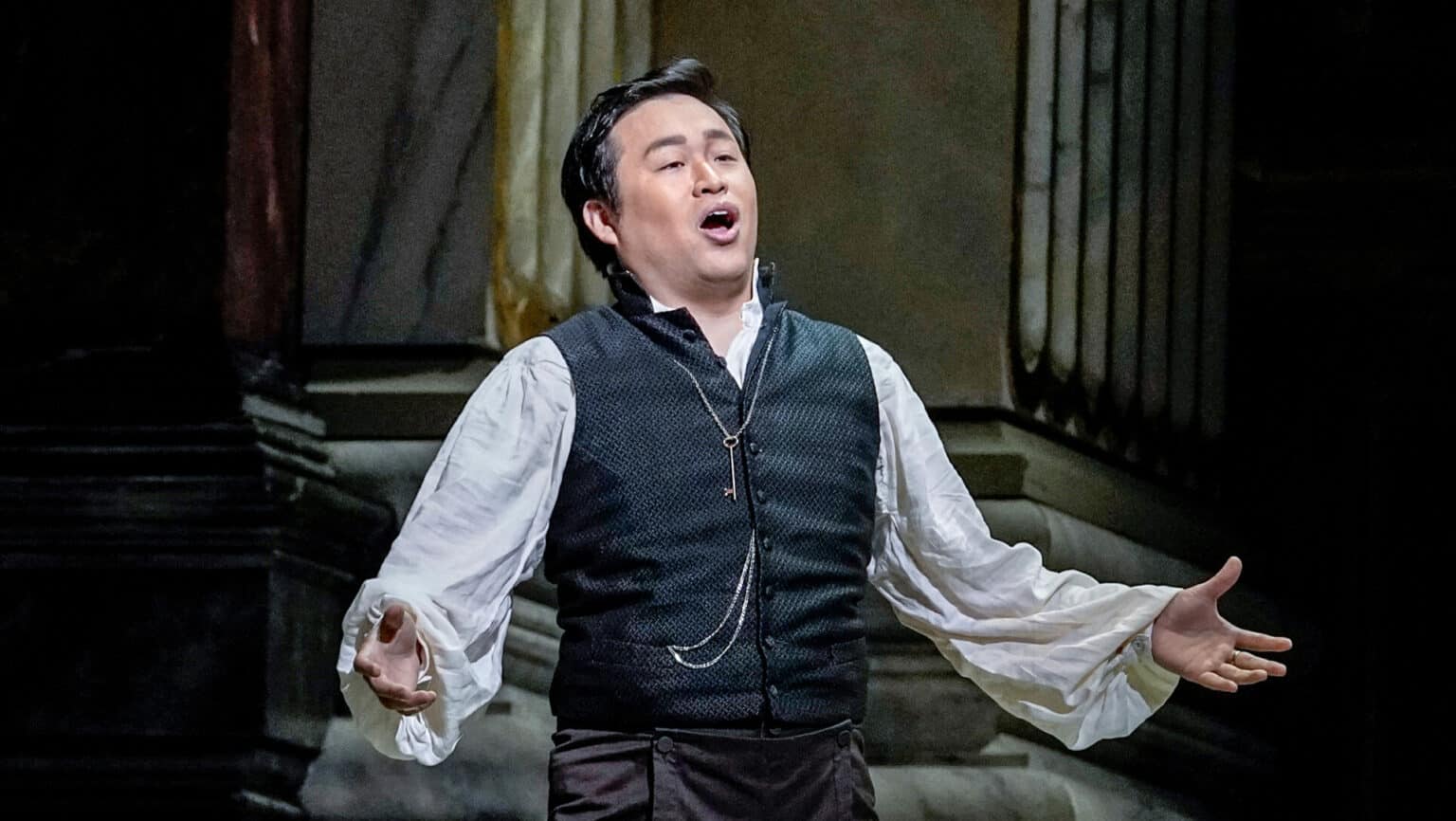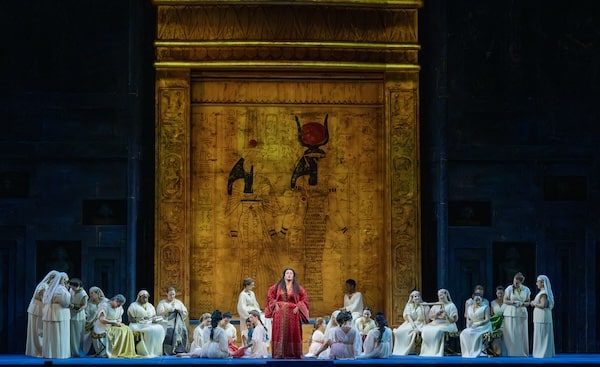LSO plans Boulez month
OrchestrasThe orchestra has scheduled four events next January for the centenary of the composer’s birth.
Details are in the new brochure but the planned lso.co.uk/boulez microsite is not working yet.
The French conductor François Xavier Roth says he has built his entire concert year for 2025 around ‘ this incredible composer and person.’







I am sure John Borstlap and Sally have already booked plane tickets and a hotel in London for next January.
No I’m going alone and I have to ask a free week for that and that will be something of a problem. But I would be prepared to be fired again to be able to be present at this great event!
Sally
At least, he´ll get a ticket….Boulez fans who want to hear something live by the Dutch guy can´t. He has no performances.
Dear “Professional Musician” : Assuming you truly are a professional musician, you’re well aware that the life of any artist is challenging enough that anyone who cares about creativity and/or loves the arts should have the decency (and I would hope the kindness) to not make it even more difficult for other artists by making mean-spirited, cruel comments about their work – even anonymously.
If you don’t like John Borstlap’s music, then don’t listen to it. And if you don’t like John Borstlap, don’t speak with him.
But otherwise, save your bitterness and cruelty for your therapist. And if you don’t have one, you’d probably do those in your life a great favor by getting one, so you can find out and address why you’re going through life with such toxic negativity.
There’s a brilliant music therapist in Frankfurt specialized in such cases. I have an aunt living there, she was married to a teacher at a relevant conservatory who made her life incredibly miserable (like forcing her to take trombone lessons). But she recovered wonderfully by the treatment and now she’s with an accordeonist from Budapest, I think that’s somewhere in Rumania.
Sally
As my mother used to say, “if you can’t say anything nice about a person, don’t say anything.” But to add a little balance, I don’t recall hearing of “Professional Musician” denying that John Borstlap’s works are music at all, nor of him disrupting performances of other composers’ work because he didn’t feel he was getting enough attention.
I never thought Beethoven 9 could ever be uninspired, bland and boring, yet this is exactly how Roth made it sound in his performance with the LSO last year. I have never heard a worse performance of the work.
I played in a performance of this piece(and many more) under him…It was exciting,fresh,swift, following mostly Beethoven´s metronome markings, ..but also elastic and subtle…I can´t listen(and avoid to play,if possible,in) pre HIP performances any more. I´ve never liked the piece in most performances and recordings before, let´s say 2000.It seemed always a series of unrelated events, and the pathos many comductors applied to the first and,especially,last mvt made me cringe…Not with Roth.Very fine performance by a very fine and versatile conductor..Not for nothing he is one of the favourite guest conductors of the Berlin Phil, BSO,and LSO,among others.
Oh! A professional musician has performances! Alas, they are not of his own music.
Pathos is the key word here and I agree with you that I didn’t hear any of it in the June performance. The piece sounded as if it could have been fed into the computer and played back… no humanity, grandeur or shooting for the stars. A truly dreadful performance!
I get that we have completely different tastes – that’s why I will be skipping his future performances with the LSO and you can enjoy playing under him.
One should understand PB’s approach to conducting. For him, it is the score and not all the stuff around it and the suggestions between the notes (as Mahler said) that a conductor should try to perform. And as clearly as possible and including all the indications. Cultural background, biographical data, psychological mongering, all of that is non-essential material that only clutters the music, in his opinion. He wrote extensively about that.
A bit more and his music will die off, just like Schönberg’s. Although the latter, to his credit, didn’t to be a famous conductor to make a career as a composer!
Schoenberg’s music has never been more alive.
Welcome to many empty seats!
They contribute to the acoustical resonances, they are often in the scores: ‘Assurez qu’il y a des sièges vacants pour améliorer les résonances harmoniques dès cis de l’octave premier’ (Eclat Multiples, introduction)
Can’t find any information about its concerts on tour.
It is undeniable, indisputable, that Pierre Boulez was influential.
He was perhaps the most influential figure in classical music in post-war France and Europe to the end of the 20th Century, and his legacy, even just in terms of brick-and-mortar concert halls named after him, will go far longer into history.
Oh oh! Do we have to go into that again? PB tried to dictate ‘the course of modern music’ and invested immense efforts to create a network of interests, to be able to blot-out any alternative ideas to his narrow-minded ideology. He and his followers attacked any dissent voice in the new music field, and Henri Dutilleux was often on the receiving end of the barbs, although he never reacted to them. I spoke with the radio programmer at the french radio at the time, who told me how PB tried to reign as a dictator over french musical life and how he himself tried to defend pluralism, therefore supporting Dutilleux. And in spite of all of PB’s efforts, his works have never been warmly embraced by audiences, it was and still is always something for a fringe group of narrow-minded tone-deaf ‘idealists’ with very restricted ideas about modernity, and lacking understanding of the nature of the art form. Meanwhile, France recovered and produced such truly musically-gifted composers like Nicolas Bacri, Guillaume Connesson, Karol Beffa, Thierry Escaich. And in spite of the contempt of the Boulezbian camp, the so-called ‘conservatives’ Francis Poulenc and Maurice Duruflé who never bought the modernist nonsense, have become part of the regular repertoire.
For people who don’t know who PB was:
https://subterraneanreview.blogspot.com/2016/01/notes-on-boulez.html
In 2012 the french pianist Jerome Ducros delivered a witty lecture at the Collège de France, analysing and criticizing modernism as an ideology, which unleashed a hughe attack from the PB network, creating a scandal infesting the media for almost a year. This showed the totalitarian nature of everything that PB represented concerning ‘new music’. Enough said.
http://www.college-de-france.fr/site/en-karol-beffa/seminar-2012-12-20-15h00.htm
https://fr.wikipedia.org/wiki/J%C3%A9r%C3%B4me_Ducros
If anyone enjoys Boulez’s music, then I’m genuinely happy for them (and utterly mystified). But as a friend of mine said about a Boulez CD he listened to (and I’m paraphrasing), the sounds of a piano being pushed down the basement stairs before it reaches its inevitable end would be more enjoyable to listen to than Boulez’s compositions.
Go back to listening to lift music then. Fool
Lift music: music that could fill a lift, as opposed to empty one.
Bruckner, Mahler, Sibelius, Richard Strauss – now, that’s what I call lift music.
Here in the house we have a loop recording of a golden shower scene from a Strauss opera in the elevator. I find that a) very promising and b) truly uplifting!
Sally
It´s music for grown ups.as my mom used to say….There´s always some inane Jenkins, Max Richter ,or,what´s the name of the funny dutch guy who posts sometimes a few stale jokes on this side…
Typical burb from the little, dark corner where ideas of the last century about ‘progressiveness’ and ‘modernity’ still hang around, like the smell of something that has long passed it’s selling date. Music history as something akin to science, developing from simple, underdeveloped attempts (Josquin, Monteverdi, JS Bach, Mozart, Beethoven, Brahms, Wagner, Mahler) towards every greater complexity of musical language (Schoenberg, Webern, Boulez), towards a musical language worthy of our fantastic Western modernity (cell phones, computers, vacuum cleaners, nuclear bumbs, internet, social media, elevators, speed trains etc. etc.). A very wrong, and very stale tale, ignoring the reality of the art form: music is more than its ‘language’. But the narrative is attractive for people who cannot grasp the nature of the art form, because it seems to offer a grip upon something that is otherwise entirely mysterious to them. In itself it is of anthropological and psychological interest, because it is a form of mental materialism.
I sincerely hope to see John Borstlap at each and every one of those events.
If one seriously studied PB’s works and has read his Bible (‘Orientations’, Faber & Faber), one does not need to listen to any of his works more than once.
By the way, it is wholeheartedly recommended to listen to PB’s works, but you first have to forget about music. As sonic art, it has nice and often sophisticated sound patterns to offer. It is a kind of snob ambient music.
During PB’s reign in Paris, inclusing the suburbs, composition students had to deliver an oath with one hand on ‘Orientations’ (a big black tome) and the other pointed towards Heaven, pronouncing in the presence of two classified witnesses, that they believed in PB and his notion of modernity once and for all and for all eternity.
Who?
Don’t worry, it is for real professional musicians.
Well that sounds like a toe-tapping good time! I imagine there are enough Boulez fans in London to get excited about this. Elsewhere I’m not so sure.
Oh this news makes me so happy!
Sally
Sally, I love that you speak your mind, without fear of John.
Oh I’m very emancipated & every time I’m fired, I simply come back.
Sally
Where can we hear something of your music live now, Sally? Any dates?
I don’t write that stuff myself dear. I’m only PA and that is more than enough, with these few dates in the planning. As we all know, it’s quantity that counts not quality! So, fortunately there’s not much work to oversee. You also like quantity? Great! You must be a German!
Sally
Mm-hm. Something tells me it won’t be hard to get tickets.
Some predictably silly comments in response. Some of it is a hard listen, but other pieces (Le Visage Nuptial, Repons, Rituel) are not. But the lift music mob will never be happy of course. Swine will never see the point of pearls.
Without stooping to animalistic comparisons, one should listen with discrimination. B’s early work ‘Notations’ (version for orchestra) has Schönbergian qualities of violence and utter frustration, a type of intensity he quickly left behind because it reminded him of the Past (Viennese expressionism). The influence of Messiaen in terms of time experience, but shed from its religious overtones, turned his works into static collections of ‘events’, unrelated. Occasional outbursts of energy remain isolated, and are only sonic events, offering contrast to the surrounding ripples. With music is has nothing to do, and it is on that point that the continuing misunderstandings can be located. PB wrote extensively about what occupied him during their gestation: the balance between order and freedom, something that has always been a concern of every composer and on a very basic level (if you could not understand that, you could not write good music). It became a problem when no difference could be detected between ordered and free stretches in the listening experience, which shows-up the problem of sonic art as a whole.
Come on chaps, love him or loathe him he was a giant of twentieth / early twenty first century music!
No, that is an entirely wrong notion. He belonged to the type of people who love totalitarianism: a product of the dark last century.
Ligeti did well at the London box office during his recent centenary year.
Don’t be so sure that Boulez will empty the Concert Halls.
Unlikely as it may sound, but Ligeti was really musical. That was also his tragedy.
The funny comments of some goners were predictable.
There´s an old saying in Germany:
” Was kümmert es die stolze Eiche ,wenn sich ein Borstenvieh an ihr reibt(What does the oak tree care,if a sow rubs itself against it)
I’m fond of German sayings, they always have a ring of depth around it, also where they are wrong or entirely inappropriate: ‘Ich bin immer so froh! Weiter bin ich nichts.’ (‘Aus dem Briefwechsel eines völlig unbekannten Schwäbischen Schriftstellers’, quoted from from Max Müller’s History of German Literature)
I’ve been back through all my André Rieu programmes and the maestro doesn’t seem to have played any of this Mr Boulez’s pieces. That’s enough to tell me that I certainly shan’t be going.
Rieu’s version of the first Pli of Pli selon Pli turned a Viennese audience to tears in 2018.
I think this is the first time Rattle has conducted Benjamin’s music since he gave the premiere of At First Light, over 40 years ago. I’m very glad to see he’s doing this.
Re the entire series as a whole, while it’s good that the LSO is doing this, it’s a shame that the scope is so modest, but I assume this is a question of cost. It would be wonderful for example to hear Rattle do Le Visage Nuptial. I hope the BBC is planning a suitably ambitious tribute.
The licensing fees and royalties alone that have to be paid under Boulez’s copyright will exceed ticket sales.
I wouldn’t listen to Boulez for free, why would anyone pay to play him?
Delish, hope this presages some cool happenings on the U.S. side of the pond to celebrate this anniversary. Getting my Pollini and Idel Biret Boulez piano recordings on the turntable now to set the mood. Might as well toss Dame Uchida’s wonderful Schoenberg caper with Maestro B. himself along with those short Webern pieces onto the pile as well, for maximum fun.
Self-correction: Idil Biret, not Idel Biret.
I enjoy listening to some of Boulez’s music (while feeling that I would probably need to be a musician to fully understand it, but that’s probably true of most music) and I rather admire him for sticking to his guns and hating almost any music that wasn’t revolutionary. That is to say, some performers are uninterested in conservative modern music but will happily play conservative composers from the past. But of Boulez’s favorite dead composers, Ravel was probably the only one can’t really be considered a musical progressive, and the only Romantic composers he conducted regularly were Berlioz and Wagner.
The idea that art must be progressive or else it’s worthless was a harmful one, and his role in promoting that idea is the biggest black mark against him, but you certainly can’t accuse him of not meaning it.